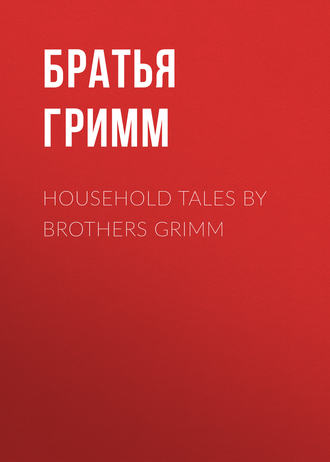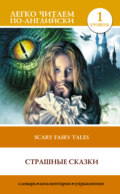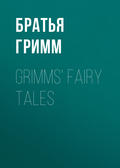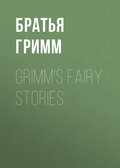
Братья Гримм
Household Tales by Brothers Grimm
180 Eve's Various Children
When Adam and Eve were driven out of Paradise, they were compelled to build a house for themselves on unfruitful ground, and eat their bread in the sweat of their brow. Adam dug up the land, and Eve span. Every year Eve brought a child into the world; but the children were unlike each other, some pretty, and some ugly. After a considerable time had gone by, God sent an angel to them, to announce that he was coming to inspect their household. Eve, delighted that the Lord should be so gracious, cleaned her house diligently, decked it with flowers, and strewed reeds on the floor. Then she brought in her children, but only the beautiful ones. She washed and bathed them, combed their hair, put clean raiment on them, and cautioned them to conduct themselves decorously and modestly in the presence of the Lord. They were to bow down before him civilly, hold out their hands, and to answer his questions modestly and sensibly. The ugly children were, however, not to let themselves be seen. One hid himself beneath the hay, another under the roof, a third in the straw, the fourth in the stove, the fifth in the cellar, the sixth under a tub, the seventh beneath the wine-cask, the eighth under an old fur cloak, the ninth and tenth beneath the cloth out of which she always made their clothes, and the eleventh and twelfth under the leather out of which she cut their shoes. She had scarcely got ready, before there was a knock at the house-door. Adam looked through a chink, and saw that it was the Lord. Adam opened the door respectfully, and the Heavenly Father entered. There, in a row, stood the pretty children, and bowed before him, held out their hands, and knelt down. The Lord, however, began to bless them, laid his hands on the first, and said, "Thou shalt be a powerful king;" and to the second, "Thou a prince," to the third, "Thou a count," to the fourth, "Thou a knight," to the fifth, "Thou a nobleman," to the sixth, "Thou a burgher," to the seventh, "Thou a merchant," to the eighth, "Thou a learned man." He bestowed upon them also all his richest blessings. When Eve saw that the Lord was so mild and gracious, she thought, "I will bring hither my ill-favoured children also, it may be that he will bestow his blessing on them likewise." So she ran and brought them out of the hay, the straw, the stove, and wherever else she had concealed them. Then came the whole coarse, dirty, shabby, sooty band. The Lord smiled, looked at them all, and said, "I will bless these also." He laid his hands on the first, and said to him, "Thou shalt be a peasant," to the second, "Thou a fisherman," to the third, "Thou a smith," to the fourth, "Thou a tanner," to the fifth, "Thou a weaver," to the sixth, "Thou a shoemaker," to the seventh, "Thou a tailor," to the eighth, "Thou a potter," to the ninth, "Thou a waggoner," to the tenth, "Thou a sailor," to the eleventh, "Thou an errand-boy," to the twelfth, "Thou a scullion all the days of thy life."
When Eve had heard all this she said, "Lord, how unequally thou dividest thy gifts! After all they are all of them my children, whom I have brought into the world, thy favours should be given to all alike." But God answered, "Eve, thou dost not understand. It is right and necessary that the entire world should be supplied from thy children; if they were all princes and lords, who would grow corn, thresh it, grind and bake it? Who would be blacksmiths, weavers, carpenters, masons, labourers, tailors and seamstresses? Each shall have his own place, so that one shall support the other, and all shall be fed like the limbs of one body." Then Eve answered, "Ah, Lord, forgive me, I was too quick in speaking to thee. Have thy divine will with my children."
181 The Nix of the Mill-Pond
There was once upon a time a miller who lived with his wife in great contentment. They had money and land, and their prosperity increased year by year more and more. But ill-luck comes like a thief in the night, as their wealth had increased so did it again decrease, year by year, and at last the miller could hardly call the mill in which he lived, his own. He was in great distress, and when he lay down after his day's work, found no rest, but tossed about in his bed, full of care. One morning he rose before daybreak and went out into the open air, thinking that perhaps there his heart might become lighter. As he was stepping over the mill- dam the first sunbeam was just breaking forth, and he heard a rippling sound in the pond. He turned round and perceived a beautiful woman, rising slowly out of the water. Her long hair, which she was holding off her shoulders with her soft hands, fell down on both sides, and covered her white body. He soon saw that she was the Nix of the Mill-pond, and in his fright did not know whether he should run away or stay where he was. But the nix made her sweet voice heard, called him by his name, and asked him why he was so sad? The miller was at first struck dumb, but when he heard her speak so kindly, he took heart, and told her how he had formerly lived in wealth and happiness, but that now he was so poor that he did not know what to do. "Be easy," answered the nix, "I will make thee richer and happier than thou hast ever been before, only thou must promise to give me the young thing which has just been born in thy house." "What else can that be," thought the miller, "but a young puppy or kitten?" and he promised her what she desired. The nix descended into the water again, and he hurried back to his mill, consoled and in good spirits. He had not yet reached it, when the maid-servant came out of the house, and cried to him to rejoice, for his wife had given birth to a little boy. The miller stood as if struck by lightning; he saw very well that the cunning nix had been aware of it, and had cheated him. Hanging his head, he went up to his wife's bedside and when she said, "Why dost thou not rejoice over the fine boy?" he told her what had befallen him, and what kind of a promise he had given to the nix. "Of what use to me are riches and prosperity?" he added, "if I am to lose my child; but what can I do?" Even the relations, who had come thither to wish them joy, did not know what to say. In the meantime prosperity again returned to the miller's house. All that he undertook succeeded, it was as if presses and coffers filled themselves of their own accord, and as if money multiplied nightly in the cupboards. It was not long before his wealth was greater than it had ever been before. But he could not rejoice over it untroubled, for the bargain which he had made with the nix tormented his soul. Whenever he passed the mill-pond, he feared she might ascend and remind him of his debt. He never let the boy himself go near the water. "Beware," he said to him, "if thou dost but touch the water, a hand will rise, seize thee, and draw thee down." But as year after year went by and the nix did not show herself again, the miller began to feel at ease. The boy grew up to be a youth and was apprenticed to a huntsman. When he had learnt everything, and had become an excellent huntsman, the lord of the village took him into his service. In the village lived a beautiful and true-hearted maiden, who pleased the huntsman, and when his master perceived that, he gave him a little house, the two were married, lived peacefully and happily, and loved each other with all their hearts.
One day the huntsman was chasing a roe; and when the animal turned aside from the forest into the open country, he pursued it and at last shot it. He did not notice that he was now in the neighbourhood of the dangerous mill-pond, and went, after he had disembowelled the stag, to the water, in order to wash his blood-stained hands. Scarcely, however, had he dipped them in than the nix ascended, smilingly wound her dripping arms around him, and drew him quickly down under the waves, which closed over him. When it was evening, and the huntsman did not return home, his wife became alarmed. She went out to seek him, and as he had often told her that he had to be on his guard against the snares of the nix, and dared not venture into the neighbourhood of the mill-pond, she already suspected what had happened. She hastened to the water, and when she found his hunting-pouch lying on the shore, she could no longer have any doubt of the misfortune. Lamenting her sorrow, and wringing her hands, she called on her beloved by name, but in vain. She hurried across to the other side of the pond, and called him anew; she reviled the nix with harsh words, but no answer followed. The surface of the water remained calm, only the crescent moon stared steadily back at her. The poor woman did not leave the pond. With hasty steps, she paced round and round it, without resting a moment, sometimes in silence, sometimes uttering a loud cry, sometimes softly sobbing. At last her strength came to an end, she sank down to the ground and fell into a heavy sleep. Presently a dream took possession of her. She was anxiously climbing upwards between great masses of rock; thorns and briars caught her feet, the rain beat in her face, and the wind tossed her long hair about. When she had reached the summit, quite a different sight presented itself to her; the sky was blue, the air soft, the ground sloped gently downwards, and on a green meadow, gay with flowers of every colour, stood a pretty cottage. She went up to it and opened the door; there sat an old woman with white hair, who beckoned to her kindly. At that very moment, the poor woman awoke, day had already dawned, and she at once resolved to act in accordance with her dream. She laboriously climbed the mountain; everything was exactly as she had seen it in the night. The old woman received her kindly, and pointed out a chair on which she might sit. "Thou must have met with a misfortune," she said, "since thou hast sought out my lonely cottage." With tears, the woman related what had befallen her. "Be comforted," said the old woman, "I will help thee. Here is a golden comb for thee. Tarry till the full moon has risen, then go to the mill-pond, seat thyself on the shore, and comb thy long black hair with this comb. When thou hast done, lay it down on the bank, and thou wilt see what will happen." The woman returned home, but the time till the full moon came, passed slowly. At last the shining disc appeared in the heavens, then she went out to the mill-pond, sat down and combed her long black hair with the golden comb, and when she had finished, she laid it down at the water's edge. It was not long before there was a movement in the depths, a wave rose, rolled to the shore, and bore the comb away with it. In not more than the time necessary for the comb to sink to the bottom, the surface of the water parted, and the head of the huntsman arose. He did not speak, but looked at his wife with sorrowful glances. At the same instant, a second wave came rushing up, and covered the man's head. All had vanished, the mill-pond lay peaceful as before, and nothing but the face of the full moon shone on it. Full of sorrow, the woman went back, but again the dream showed her the cottage of the old woman. Next morning she again set out and complained of her woes to the wise woman. The old woman gave her a golden flute, and said, "Tarry till the full moon comes again, then take this flute; play a beautiful air on it, and when thou hast finished, lay it on the sand; then thou wilt see what will happen." The wife did as the old woman told her. No sooner was the flute lying on the sand than there was a stirring in the depths, and a wave rushed up and bore the flute away with it. Immediately afterwards the water parted, and not only the head of the man, but half of his body also arose. He stretched out his arms longingly towards her, but a second wave came up, covered him, and drew him down again. "Alas, what does it profit me?" said the unhappy woman, "that I should see my beloved, only to lose him again!" Despair filled her heart anew, but the dream led her a third time to the house of the old woman. She set out, and the wise woman gave her a golden spinning-wheel, consoled her and said, "All is not yet fulfilled, tarry until the time of the full moon, then take the spinning-wheel, seat thyself on the shore, and spin the spool full, and when thou hast done that, place the spinning-wheel near the water, and thou wilt see what will happen." The woman obeyed all she said exactly; as soon as the full moon showed itself, she carried the golden spinning-wheel to the shore, and span industriously until the flax came to an end, and the spool was quite filled with the threads. No sooner was the wheel standing on the shore than there was a more violent movement than before in the depths of the pond, and a mighty wave rushed up, and bore the wheel away with it. Immediately the head and the whole body of the man rose into the air, in a water-spout. He quickly sprang to the shore, caught his wife by the hand and fled. But they had scarcely gone a very little distance, when the whole pond rose with a frightful roar, and streamed out over the open country. The fugitives already saw death before their eyes, when the woman in her terror implored the help of the old woman, and in an instant they were transformed, she into a toad, he into a frog. The flood which had overtaken them could not destroy them, but it tore them apart and carried them far away. When the water had dispersed and they both touched dry land again, they regained their human form, but neither knew where the other was; they found themselves among strange people, who did not know their native land. High mountains and deep valleys lay between them. In order to keep themselves alive, they were both obliged to tend sheep. For many long years they drove their flocks through field and forest and were full of sorrow and longing. When spring had once more broken forth on the earth, they both went out one day with their flocks, and as chance would have it, they drew near each other. They met in a valley, but did not recognize each other; yet they rejoiced that they were no longer so lonely. Henceforth they each day drove their flocks to the same place; they did not speak much, but they felt comforted. One evening when the full moon was shining in the sky, and the sheep were already at rest, the shepherd pulled the flute out of his pocket, and played on it a beautiful but sorrowful air. When he had finished he saw that the shepherdess was weeping bitterly. "Why art thou weeping?" he asked. "Alas," answered she, "thus shone the full moon when I played this air on the flute for the last time, and the head of my beloved rose out of the water." He looked at her, and it seemed as if a veil fell from his eyes, and he recognized his dear wife, and when she looked at him, and the moon shone in his face she knew him also. They embraced and kissed each other, and no one need ask if they were happy.
182 The Little Folks' Presents
A tailor and a goldsmith were travelling together, and one evening when the sun had sunk behind the mountains, they heard the sound of distant music, which became more and more distinct. It sounded strange, but so pleasant that they forgot all their weariness and stepped quickly onwards. The moon had already arisen when they reached a hill on which they saw a crowd of little men and women, who had taken each other's hands, and were whirling round in the dance with the greatest pleasure and delight.
They sang to it most charmingly, and that was the music which the travellers had heard. In the midst of them sat an old man who was rather taller than the rest. He wore a parti-coloured coat, and his iron-grey beard hung down over his breast. The two remained standing full of astonishment, and watched the dance. The old man made a sign that they should enter, and the little folks willingly opened their circle. The goldsmith, who had a hump, and like all hunchbacks was brave enough, stepped in; the tailor felt a little afraid at first, and held back, but when he saw how merrily all was going, he plucked up his courage, and followed. The circle closed again directly, and the little folks went on singing and dancing with the wildest leaps. The old man, however, took a large knife which hung to his girdle, whetted it, and when it was sufficiently sharpened, he looked round at the strangers. They were terrified, but they had not much time for reflection, for the old man seized the goldsmith and with the greatest speed, shaved the hair of his head clean off, and then the same thing happened to the tailor. But their fear left them when, after he had finished his work, the old man clapped them both on the shoulder in a friendly manner, as much as to say, they had behaved well to let all that be done to them willingly, and without any struggle. He pointed with his finger to a heap of coals which lay at one side, and signified to the travellers by his gestures that they were to fill their pockets with them. Both of them obeyed, although they did not know of what use the coals would be to them, and then they went on their way to seek a shelter for the night. When they had got into the valley, the clock of the neighbouring monastery struck twelve, and the song ceased. In a moment all had vanished, and the hill lay in solitude in the moonlight.
The two travellers found an inn, and covered themselves up on their straw-beds with their coats, but in their weariness forgot to take the coals out of them before doing so. A heavy weight on their limbs awakened them earlier than usual. They felt in the pockets, and could not believe their eyes when they saw that they were not filled with coals, but with pure gold; happily, too, the hair of their heads and beards was there again as thick as ever.
They had now become rich folks, but the goldsmith, who, in accordance with his greedy disposition, had filled his pockets better, was as rich again as the tailor. A greedy man, even if he has much, still wishes to have more, so the goldsmith proposed to the tailor that they should wait another day, and go out again in the evening in order to bring back still greater treasures from the old man on the hill. The tailor refused, and said, "I have enough and am content; now I shall be a master, and marry my dear object (for so he called his sweetheart), and I am a happy man." But he stayed another day to please him. In the evening the goldsmith hung a couple of bags over his shoulders that he might be able to stow away a great deal, and took the road to the hill. He found, as on the night before, the little folks at their singing and dancing, and the old man again shaved him clean, and signed to him to take some coal away with him. He was not slow about sticking as much into his bags as would go, went back quite delighted, and covered himself over with his coat. "Even if the gold does weigh heavily," said he, "I will gladly bear that," and at last he fell asleep with the sweet anticipation of waking in the morning an enormously rich man.
When he opened his eyes, he got up in haste to examine his pockets, but how amazed he was when he drew nothing out of them but black coals, and that howsoever often he put his hands in them. "The gold I got the night before is still there for me," thought he, and went and brought it out, but how shocked he was when he saw that it likewise had again turned into coal. He smote his forehead with his dusty black hand, and then he felt that his whole head was bald and smooth, as was also the place where his beard should have been. But his misfortunes were not yet over; he now remarked for the first time that in addition to the hump on his back, a second, just as large, had grown in front on his breast. Then he recognized the punishment of his greediness, and began to weep aloud. The good tailor, who was wakened by this, comforted the unhappy fellow as well as he could, and said, "Thou hast been my comrade in my travelling time; thou shalt stay with me and share in my wealth." He kept his word, but the poor goldsmith was obliged to carry the two humps as long as he lived, and to cover his bald head with a cap.







